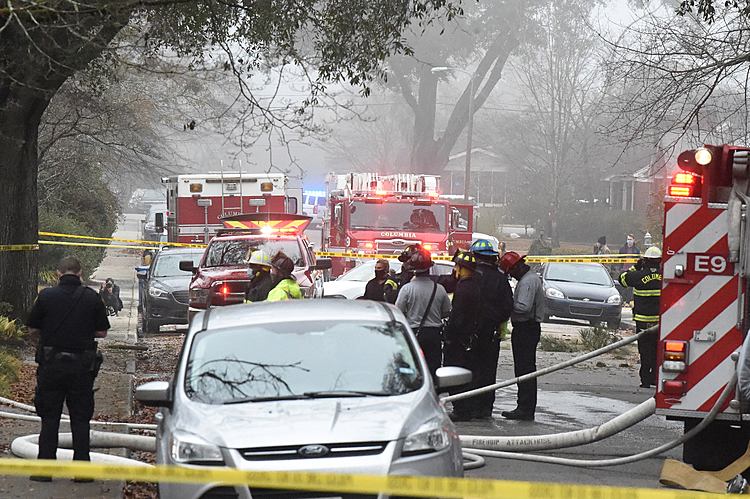Latest: FDA panel to offer recommendations on booster shots
WASHINGTON — Government advisers are debating whether to recommend extra doses of the Pfizer vaccine, a key step toward the Biden administration’s plan to dispense COVID-19 booster shots to most Americans.
Scientists inside and outside the U.S. government have been divided in recent days over the need for boosters and who should get them. A panel of Food and Drug Administration advisers will vote Friday on the safety and effectiveness of boosters.
This week, two top FDA vaccine reviewers joined a group of international scientists in publishing an editorial rejecting the need for boosters in healthy people. The scientists said continuing studies show the shots are working well despite the delta variant.
If the FDA approves the extra doses, a separate committee convened by the Centers for Disease Control and Prevention will debate who should get boosters and when.
The World Health Organization has strongly objected to rich nations giving a third round of shots when poor countries don’t have enough vaccine for their first.
___
MORE ON THE PANDEMIC:
— FDA panel is first key test for Biden COVID-19 booster plan
— England plans to simplify coronavirus travel rules
— Cambodia vaccinating kids ages 6 to 11 before schools reopen
— Florida surpasses 50K COVID-19 total deaths
___
— See AP coverage at https://apnews.com/hub/coronavirus-pandemic
___
HERE’S WHAT ELSE IS HAPPENING:
LONDON — The British government says it plans to simplify rules for international travel during the coronavirus pandemic and will make an announcement Friday.
Transport Secretary Grant Shapps says on Twitter he’ll “set out measures to simplify international travel later today in order to reduce costs, take advantage of higher levels of vaccination, and keep us all safe.”
The government is under pressure to scrap its “traffic light” system that ranks countries as red, yellow or green -- high, medium or low risk from the coronavirus.
Airlines and travel businesses say Britain’s requirements are keeping people away and hampering recovery from the pandemic.
At present, people coming from “red list” countries must spend 10 days in a government-approved quarantine hotel. Unvaccinated travelers from yellow list countries must self-isolate for 10 days at home, while fully vaccinated travelers need to take coronavirus tests before and after arriving in Britain.
It’s likely the government will ease the rules that require travelers to take a highly sensitive and pricey PCR test two days after arrival. They could use a cheaper but less sensitive test instead.
Any changes will apply only to England. Scotland, Wales and Northern Ireland set their own policies.
___
PHNOM PENH, Cambodia — Cambodia is vaccinating children ages 6 to 11 so students can safely return to schools that have been closed for months due to the coronavirus.
Prime Minister Hun Sen inaugurated the campaign Friday, with his grandchildren and young family members of other senior officials shown being given their shots.
Cambodia already has been vaccinating older children. Hun Sen says he ordered health officials to study if children ages 3 to 5 can be vaccinated.
Nearly 72% of Cambodia’s almost 17 million people have received at least one COVID-19 shot since vaccinations began in February. China’s Sinovac and Sinopharm vaccines account for most inoculations.
___
GENEVA — The World Health Organization and United Nations on Friday declined to indicate how many in their workforces have been vaccinated.
“We won’t have that because it’s confidential,” said Dr. Margaret Harris, a WHO spokeswoman.
U.N. Geneva spokeswoman Alessandra Vellucci said: “We don’t disclose this kind of information. It’s something that is said to the medical service. So, no, unfortunately, we won’t be able to give you these numbers.”
Vellucci says she’ll look into whether percentages of staff that had been vaccinated could be provided.
In November, WHO indicated 65 of its staffers had tested positive for COVID-19 at the time, confirming information in an internal e-mail obtained by The Associated Press. The U.N. office in Geneva has often indicated how many of its staff tested positive.
Governments list how many people are vaccinated against the coronavirus, and the WHO compiles the information and reports on it. Some countries and companies require vaccines for their workers to go to their jobs.
___
COLOMBO, Sri Lanka — Sri Lanka on Friday extended the COVID-19 lockdown by another two weeks amid pressure from medical experts.
The current lockdown was to end on Tuesday. A special meeting of the COVID-19 Control Committee chaired by President Gotabhaya Rajapaksa decided to extend the measures until Oct. 1, according to presidential spokesman Kingsly Rathnayaka.
Medical experts have said although Sri Lanka has seen a decline in daily cases, oxygen requirements and deaths, it remains at risk. The last 24 hours saw 2,314 confirmed cases.
The lockdown was first imposed on Aug. 20 and extended four times.
The government has allowed export-oriented factories and agriculture work to continue, in addition to essential services.
Sri Lanka has so far reported 496,423 confirmed cases and 11,699 deaths.
___
BEIJING — China has reported another 62 cases of the coronavirus, even as the number of Chinese citizens fully vaccinated has topped 1 billion.
All but one of the cases was detected over the previous 24 hours in the eastern coastal province of Fujian in China’s latest outbreak of the delta variant, the National Health Commission said on Friday.
Of those, 31 were in the major port city of Xiamen, with 28 others in the city of Putian and one in the city of Quanzhou.
That came a day after health officials announced that more than 1 billion Chinese, or 72% of all 1.4 billion citizens of the world’s most populous country, have been fully vaccinated. The National Health Commission says 2.16 billion doses have been administered.
Nearly 300 cases have been detected in Fujian over the past week, prompting authorities to lock down affected neighborhoods, close schools and entertainment venues and restrict travel out of the province.
China has largely stopped the spread by imposing restrictions and mass testing whenever new cases are found. It also limits entry to the country and requires people who arrive to quarantine in a hotel for at least two weeks.
The efficacy of Chinese vaccines has been questioned, however, and it’s not clear how many of those newly infected had received their jabs.
China has recorded a total of 4,636 confirmed deaths and 95,577 confirmed cases. There are 916 people currently receiving treatment for the disease.
___
CANBERRA, Australia — Australians will soon have a third COVID-19 vaccine option with 1 million Moderna shots about to arrive in Sydney.
Moderna will arrive in two shipments on Friday night and over the weekend, Health Minister Greg Hunt says.
Australians currently have access to Pfizer and AstraZeneca as authorities race to build the population’s immunity against the delta variant that has taken hold in Sydney, Melbourne and Canberra.
Pfizer is the preferred option for many because of the slight risk of blood clots from AstraZeneca.
Moderna, like Pfizer, is an mRNA vaccine. Australia has failed to source sufficient Pfizer to meet demand, while there is a surplus of locally manufactured AstraZeneca.
More than 70% of the Australian population age 16 and older have taken at least one dose of a two-shot vaccine, Hunt says
___
SEOUL, South Korea — South Korea has reported more than 2,000 new cases of the coronavirus, nearing a one-day record set last month, ahead of the biggest holiday of the year.
The 2,008 cases reported Friday was the 73rd consecutive day of more than 1,000, despite officials enforcing the country’s strongest social distancing rules short of a lockdown in Seoul and other large population centers for the past 10 weeks.
More than 1,500 cases came from the greater Seoul area, home to half of a population of more than 51 million. Infections have surged as schools reopened and people returned from summer vacations in recent weeks.
There are concerns that transmissions will worsen nationwide the Chuseok holiday break, the Korean version of Thanksgiving that begins over the weekend and continues through next Wednesday. Millions usually travel across the to meet relatives during Chuseok.
“We plead once again that people who aren’t fully vaccinated not to visit their aging parents who are in their 60s or older,” Deputy Health Minister Lee Ki-il said during a briefing.
___
SEATTLE -- Seattle and King County officials have issued a health directive requiring proof of COVID-19 vaccination or a negative test to enter certain establishments and attend large outdoor events.
Public Health-Seattle & King County Health Officer Dr. Jeff Duchin issued the order Thursday to go into effect Oct. 25. Duchin says high levels of preventable COVID-19 cases and hospitalizations and increased deaths driven by the highly contagious delta variant prompted the order.
The order applies to outdoor events with 500 or more people and indoor establishments such as museums, theaters, gyms, restaurants and bars.
The order does not affect outdoor dining, take-out orders and shopping in places including grocery stores.
___
JACKSON, Miss. — Mississippi has the highest rate of COVID-19 deaths in the U.S., with roughly 1 of every 320 Mississippians having succumbed to the coronavirus.
The state’s top health official on Thursday warned that more deaths will come.
“We’re recording well over 2,500 (cases) a day, in recent days, far more than we’d like to see,” said State Health Officer Dr. Thomas Dobbs. “A lot of that’s going to translate into the tragedy.”
Since the start of the pandemic, at least 9,165 people in Mississippi have died of the virus. The state has a population of roughly 3 million and has one of the worst vaccination rates in the country.
Of specific concern during the delta variant surge in Mississippi have been pregnant mothers, Dobbs said. During the pandemic, 15 pregnant women in Mississippi have died of coronavirus, according to the Department of Health. Eight of those deaths occurred between July 25 and Sept. 16.
___
HELENA, Mont. — A hospital in Helena was forced to implement crisis standards of care amid a surge in COVID-19 patients, hospital officials said Thursday.
Critical care resources are at maximum capacity at St. Peter’s Health hospital. Crisis standards of care are implemented when hospital resources are not sufficient to provide full care to all patients in the facility. Under such conditions, care providers must sometimes choose how to allocate scare resources including medications and beds.
St. Peter’s Health chief medical officer Dr. Shelly Harkins said the constraints in the hospital are worse than what was seen earlier in the pandemic.
“For the first time in my career, we are at the point where not every patient in need will get the care that we might wish we could give,” Harkins said. “By almost every single measure we are in a far worse position than we ever were in the winter of 2020, during our first surge.”
The hospital’s intensive care unit, advanced medical unit and morgue are full. A freezer truck in the parking lot of the hospital will be used because the morgue remains full.
___











